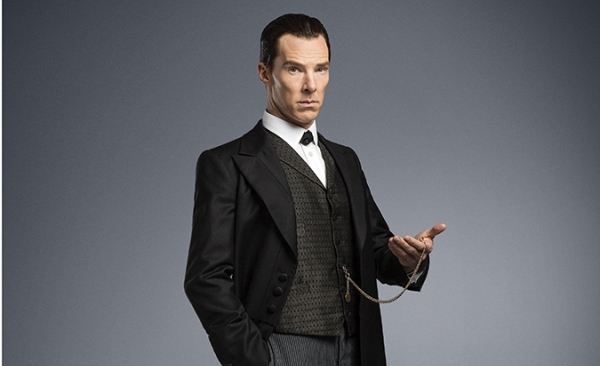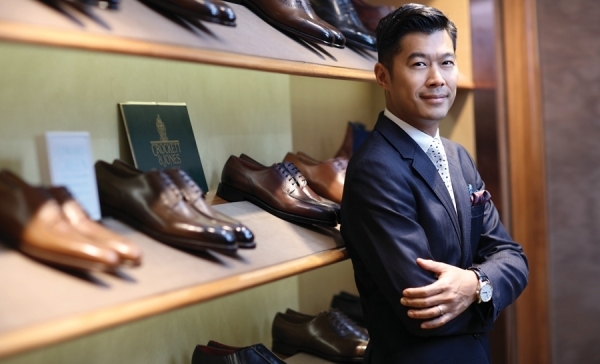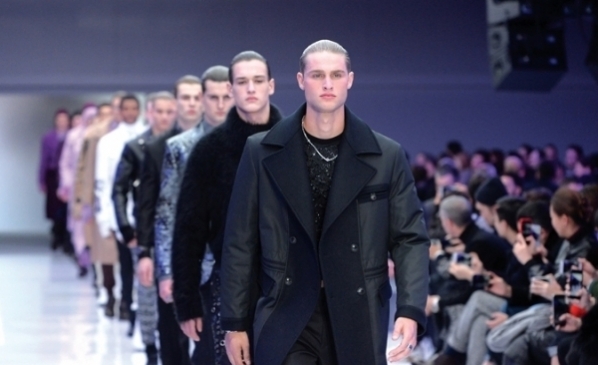
He’s intrigued, infuriated and amused as the 21st century incarnation of Sherlock Holmes, the world’s greatest detective. In the rebooted Star Trek franchise, he nearly saw off Captain Kirk and his crew before their re-tooled five-year mission even had a chance to get out of space dock. Now, he is about to debut his take on one of the most remarkable characters in the Marvel Comics universe – a universe that is already home to the mighty Avengers, the extraordinary X-Men and the somewhat eccentric Guardians of the Galaxy.
Doctor Strange, however, Marvel’s master of the arcane arts, is said to represent the greatest cinematic challenge the comic book group has ever tackled. Not only does his multi-dimension, hopping backstory require an unparalleled display of special effects, bringing to life the central character – otherworldly, aloof and almost omnipotent – in a way that could engage the modern blockbuster audience but it also calls for a leading man with a certain magic of his own. It didn’t require a huge leap of faith, then, to cast Benedict Cumberbatch.
The film’s director, Scott Derrickson, certainly had no doubts that Cumberbatch was the man for the job. At first, though, despite the obvious fit, it seemed it wouldn’t happen. The actor was already contracted to play Hamlet in a London stage production at the very time the film was scheduled to shoot.

“Sherlock might be on the side of the angels, but don’t think for one second that he’s one of them”Derrickson recalls: “Although he was the only actor we seriously considered, it just wasn’t possible. To his credit, he said: ‘I can’t bail out of Hamlet, I’ve given my word.’”
The film’s producers then looked at possible replacements, including Ryan Gosling and Jared Leto. Derrickson, though, insisted on getting his man, reportedly telling Marvel Studios: “It’s got to be Benedict.” Ultimately, he prevailed. In almost an unprecedented move, Marvel agreed to postpone both the filming schedule and the release date of Doctor Strange. Cumberbatch was in.
It was a decision that Cumberbatch clearly welcomed. He said: “I really thought I had to kiss it goodbye. If you can’t jump on board when the ride’s going past, that’s usually it. It was a huge compliment when they came back to me. I knew then I had to fulfil their faith in me.”

“Sherlock might be on the side of the angels, but don’t think for one second that he’s one of them”
Playing the lead in a Hollywood blockbuster is the latest milestone in the remarkable rise to fame of the 40-year-old British actor. It was only six years ago, however, that he seemingly sprang from nowhere to international acclaim in Sherlock, the BBC’s multi-award winning reimagining of Conan Doyle’s classic detective tales.
It’s clear Cumberbatch adores playing the 21st century Holmes. He says: “I was thrilled with how Sherlock was received. It was such great fun to film. It’s so rewarding when something you enjoy doing is so well received.”
The show, a co-production with PBS, a US network, has now run for three series, with a fourth set to be screened early next year. Its clever and imaginative adaptations of the original Conan Doyle stories have proved a hit with audiences from Beirut to Beijing. For all its story-telling genius, however, it’s Cumberbatch’s portrayal of the strange, sociopathic, emotionally austere Sherlock that has made the show such a hit.
So what does the actor make of his somewhat damaged alter ego? He says: “I don’t think he’s damaged at all. I think it’s all self-inflicted. I think there’s actually an adolescent inside him that is being deliberately repressed in order for him to try and become the ultimate, calculating deduction machine.
“What we do is remind the audience that somebody they have fallen in love with has had to let vulnerability into his life. He has a moral compass of some kind and is actually on the side of the good guys. That, though, shouldn’t make him any less terrifying.
“As Sherlock himself says: ‘I may be on the side of the angels, but don’t think for one second I’m one of them.’ He’s violent and incredibly dark, largely because of what he deals with. There should be moments where you are very uncertain of this person, times that you find him eccentric and rude, but still attractive.”
Cumberbatch also believes that Sherlock’s trademark social awkwardness is a deliberate ploy. He says: “He knows how to turn it on. He knows how to be charming. He knows how to play all the games we play in every social interaction. Yet he withdraws from them.

“The new Sherlock series is going to be very dark. We’re talking end of the universe dark”
“It’s an athlete thing. He’s reserving what he needs for when he needs it. That’s a huge difference between him and me. I kind of spend myself too easily. I’m far more of a putting it all out there person, whereas he’s incredibly controlled. That is what’s remarkable about him.
“It’s all about control. He just wants control. I think what he realises – and what Dr Watson (his friend and collaborator) teaches him – is that it’s all very well to understand human behaviour, but you have to be human to really get the benefit of it.”
The overnight success of Sherlock sometimes obscures the fact that Cumberbatch was actually a successful actor before the show came along and remains so beyond it. Despite his fondness for the role, he was recently quoted in online media saying that series 4 of Sherlock “feels like the end of an era” – hinting that he may not return to the show as his increasing popularity and work commitments crowd his hectic schedule.
Cumberbatch studied drama at Manchester University, before graduating to LAMDA, the prestigious theatre academy. His first professional appearances were at London’s West End, before breaking into TV while still in his 20s.
He is often bracketed as part of a generation of “posh boy” actors, alongside the likes of Eddie Redmayne and Tom Hiddleston (a close friend of his). In fact, all of them were educated at some of Britain’s most expensive private schools – he went to Harrow, for example, while Redmayne and Hiddleston both attended Eton.
While he’s on record as decrying “posh-bashing” in the popular press, he is unapologetic about his background. He says: “I am desperately proud of my parents for sending me to Harrow. It was a huge stretch for them. They were working actors who often never knew when the next payday would come along. My parents wanted the best for me. I wasn’t sent to the school my dad went to. I’m not a hereditary peer or anything like that.”
In the past, Cumberbatch has suggested that his social class has hindered his acting career, limiting the number of roles that he is considered for. Post-Sherlock, however, that seems much less of a handicap.

In the last few years, he’s starred as the British war-time code-breaker Alan Turing in The Imitation Game – a role for which he was nominated for an Oscar. He’s also played the pious plantation owner William Prince Ford in the award-winning movie 12 Years a Slave and provided the voice of Smaug, The Hobbit’s terrifying dragon. He also turned in a mesmerising performance as Khan, the arch-villain in Into Darkness, the second instalment in the rebooted Star Trek franchise. Although Doctor Strange is set to take Cumberbatch to another level entirely, he is quick to put the role into a broader perspective. He says: “I’m very excited about the opportunities that a bigger audience gives you, but that’s all it is, really. It’s another source of work. People look at being in big films as a sort of zenith. It’s really not.
“For me, every single job is a new beginning, a new starting point where you can learn again and begin again. It’s never a case of: ‘I’ve made it.’ Don’t get me wrong, I count my blessings every day — it’s been wonderful. I do, though, try to treat each job as a job, no matter what scale it is. Otherwise, it could get quite overwhelming. If you ever started believing your own press, you could go a little insane.”
What comes next for Cumberbatch in the wake of Doctor Strange is still unclear. In the immediate future, though, there’s series four of Sherlock to look forward to. The BBC has already confirmed the titles of the first two episodes – The Six Thatchers (a take on the Conan Doyle story The Six Napoleons) and The Lying Detective (a reference to The Dying Detective, an adventure where Holmes narrowly escapes being poisoned).
The pre-publicity has already suggested that Moriarty – Sherlock’s arch-enemy – is set to make a comeback, despite having apparently died in an earlier instalment. There’s also the likelihood that a third Holmes brother – possibly played by Cumberbatch’s pal Tom Hiddleston – will put in an appearance. Meanwhile, the show’s creators have heralded the arrival of a new bad guy, one that they describe as “purest evil, the most evil villain we’ve ever had.”
For his part, Cumberbatch isn’t giving much away, while still promising plenty of surprises for viewers to look forward to. He says: “We’ve moved on to a new step in the evolution of Sherlock in the new series. It will be dark, though. Myopically dark. We’re talking about end of the universe dark…”
Happily, this won’t be the end of Sherlock, as Cumberbatch has already signed up to a fifth series. With his movie career about to go stratospheric in the wake of Doctor Strange – with the Sorcerer Supreme already rumoured to appear in the next Avengers outing – it may be a while before we actually return to Baker Street.














